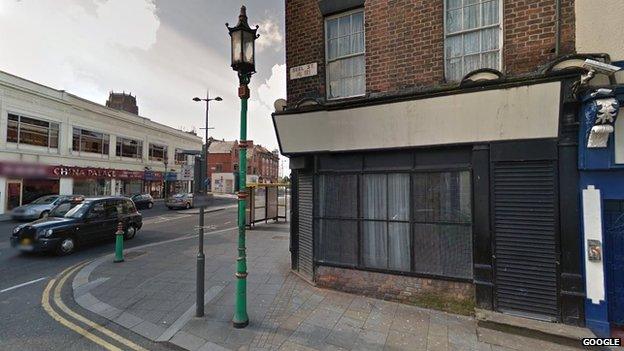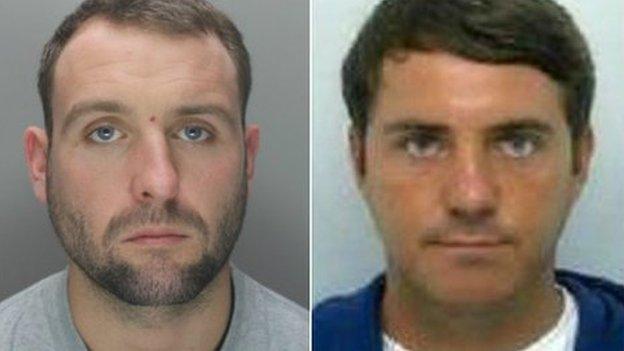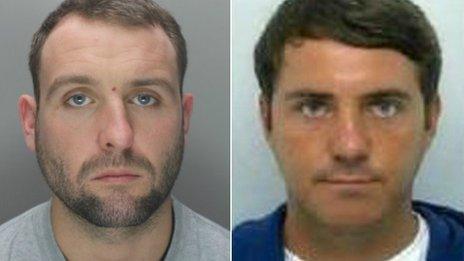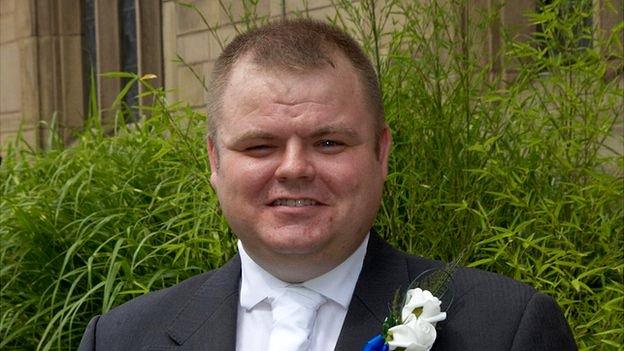How a brawl on a Christmas night out led to PC's death
- Published
.jpg)
PC Neil Doyle had been a police officer for 10 years
It should have been a Christmas night out in Liverpool with police colleagues but it turned into a brawl that ended PC Neil Doyle's life.
The 36-year-old was involved in a clash with another group of men, who were celebrating one of their birthdays, outside a city centre nightclub.
PC Doyle, who had worked for Merseyside Police for a decade, was felled by a single "pile-driver" punch that caused a fatal brain injury.
Two men were found guilty of manslaughter following a five-week trial at Liverpool Crown Court.
Football agent Andrew Taylor, 29, and sports event manager Timmy Donovan, 30, were convicted and a third man, footballer Christopher Spendlove, 30, was cleared of manslaughter.

The attack happened near a club in Colquitt Street
PC Doyle received extensive treatment outside the Aloha Club in Colquitt Street at 03:15 GMT on 19 December 2014 but died in hospital.
The following month, he had been due to take a delayed honeymoon with his wife Sarah in January, but instead his funeral took place at the church where they wed in July 2014.
PC Doyle's life came to a violent end when he sustained an injury to an artery in his neck, which led to fatal bleeding over the surface of his brain.
The men, all from Huyton, had been charged with murder, but also faced alternative manslaughter charges.

What is known of PC Neil Doyle?
He had joined the Merseyside force in May 2004, mostly working in Liverpool, and was an operational officer who was "well-liked" and "respected by his colleagues."
Flags were flown at half-mast at police stations across the county after his death and a memorial rugby match took place in Ormskirk in March.
Professionally, he had been commended for his actions when arresting three men in a "violent offensive robbery".

The two groups of men presented very different versions of events.
In an interview the following day, Taylor, who earned £40,000 a year as a football consultant, told officers that PC Doyle had been "ultra aggressive" and intimidating towards him after the two groups met as they left separate bars.
'Surprised and confused'
He told the court that he was "in fear of violence". Taylor said PC Doyle "went for him" and had to be "physically restrained". He had threatened to give him "a good hiding", Taylor added.
He claimed PC Doyle had become annoyed when he said "hello" as a joke and when Taylor tried to defuse the situation by shaking his hand, he went for him.
Taylor told the court that he had not known that PC Doyle was a police officer and he and his friends used the word "officer" as a "term of endearment" during the night out.
He insisted that he regarded police officers as "good people" and said he had "no issues" with them. Taylor was "quite surprised and confused" as to why PC Doyle became angry and swore at him.
Footage of PC Doyle confronting the other group was shown in court, but Merseyside Police resisted attempts by the media to obtain it.
Initially, Taylor told officers he had struck PC Doyle in self defence, but later denied it and said he had been mistaken.

Andrew Taylor (left) and Timmy Donovan will be sentenced in September
Mr Spendlove played football for Everton and Preston North End as a boy and studied at Oklahoma City University, where he played for their football team.
He maintained he did not play any role in the incident, which took place while they had been out celebrating his birthday.
Donovan said it was his friend Taylor, a former Forest Green Rovers footballer, who had "knocked out" PC Doyle.
He said it "all broke out very quick" and he accepted he struck PC Robert Marshall with "excessive" force before going back and stamping on him after "seeing red" for a few seconds.
Donovan left the UK on the day PC Doyle was fatally injured and was later arrested in Germany.
Sir Jon Murphy, the chief constable of Merseyside Police, said at the time the three officers were "subject to an apparently unprovoked attack."
More detail emerged in court which seemed to suggest PC Doyle was more involved than it first appeared.
'Conspiracy of silence'
However, PC Doyle's colleague told the court it was they who had felt "intimidated" moments before the confrontation.
Michael Steventon said Taylor had approached the group and asked PC Doyle if he was having a good evening and repeatedly addressed his colleague as "officer".
Under cross-examination, Mr Steventon denied there had been "a conspiracy of silence" about what had happened.
He said he viewed PC Doyle as a "mentor" and he denied that PC Doyle swore at Taylor, or angrily followed the group into Colquitt Street.
Mr Steventon also refuted claims he was "not telling the truth in the witness box in order to protect the memory of an esteemed colleague".
Taylor had "unsettled" his friend, he told the hearing, but he said he did not believe PC Doyle had known Taylor, who was described as "very persistent".
Taylor and Donovan were also convicted of wounding PC Marshall with intent. Taylor was found guilty of causing grievous bodily harm to Mr Steventon.
Prosecutors claimed Mr Spendlove watched Donovan kicking and stamping on PC Marshall before intervening in the 45-second attack on the three off-duty officers. He disputed this version of events.
The day after the brawl, Mr Spendlove went on holiday to Abersoch, north Wales, and explained he did so because he was not involved.
The jury agreed by clearing Mr Spendlove of all charges and finding Taylor and Donovan had played their part in the PC's death by reaching guilty verdicts.
- Published31 July 2015

- Published21 July 2015

- Published25 June 2015

- Published24 June 2015

- Published23 June 2015

- Published19 December 2014
.jpg)